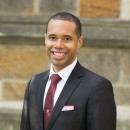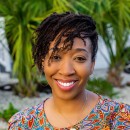School of Social Work News
Pages
 Roland Zullo's Paper Earns Annual Best Paper Award
Roland Zullo's Paper Earns Annual Best Paper AwardRoland Zullo’s paper “Explaining Privatization Failure: The Vice of Sweet Carrots and Hard Sticks” has been selected by the editorial board of the Review of Radical Political Economics as winner of the Annual Best Paper Award. The paper explains why private contracting underperforms in the production of public services.
- August 12, 2020
- Learn more »
 Natasha Johnson Defends Dissertation
Natasha Johnson Defends DissertationCongratulations to Natasha Johnson, Joint Doctoral Program in Social Work and Psychology, for successfully defending her dissertation, "You Must Work Twice as Hard for Half as Much: Racial Socialization, Racial Identity, and Racism Awareness in Adolescence." Her committee chairs were Daphne Watkins and Stephanie Rowley. Johnson was awarded the Social Behavioral and Economic Sciences Postdoctoral Research Fellowship from the National Science Foundation and will be working as a postdoctoral fellow with the U-M School of Public Health.
- August 5, 2020
- Learn more »
 Justin Hodge Wins Democratic Primary for Washtenaw County Commissioner
Justin Hodge Wins Democratic Primary for Washtenaw County CommissionerClinical Assistant Professor Justin Hodge, MSW ‘13, won the Democratic primary for Washtenaw County Commissioner, 5th District; he’ll advance to face the Republican candidate in the November election.
- August 5, 2020
- Learn more »
 How Government Relief Affects Small-Dollar Loans
How Government Relief Affects Small-Dollar LoansAssociate Professor Terri Friedline discusses the drop in demand for small-dollar loans with Morning Consult. Without additional government relief, she expects “things to get a lot worse as people are forced to take on debt, including higher-cost, small-dollar loans, to survive the pandemic.”
- August 4, 2020
- Learn more »
 Luke Shaefer quoted in The New York Times on Coronavirus Economic Relief
Luke Shaefer quoted in The New York Times on Coronavirus Economic ReliefIn March, Congress approved more than $2 trillion in economic relief, including hundreds of billions of dollars to individuals in direct stimulus payments, nutritional assistance and bigger-than-normal unemployment checks. The aid “has been much more effective than I first thought,” said Luke Shaefer “It was probably the most effective social safety net response we’ve ever had.”
- July 29, 2020
- Learn more »
- Center for Equitable Community & Family Well-Being Launches Website
Professor Trina Shanks is the director of the newly launched Center for Equitable Family & Community Well-Being, which is designed to connect the resources and the intellectual strength of U-M with the passion and social capital of community leaders. The center’s work will focus explicitly on improving the well-being of families and communities, and reducing existing inequities.
"When I first conceptualized the Center for Equitable Community & Family Well-Being in the fall of 2019, I was concerned about growing inequality and the economic insecurity faced by many Black and low-income households both in the United States and locally in Southeastern Michigan,” says Shanks. “During this current moment of crisis and uncertainty in the midst of the COVID-19 pandemic, racial protest and economic freefall, the urgency to address equity concerns becomes even more pressing. Although the center is just getting started, we have a few signature projects already underway that hint at how we intend on pursuing our vision to expose oppressive systems and empower families and communities to thrive. Please review our current work and feel free to reach out to anyone on our team with your ideas of how to collaborate on research or interventions that bring greater equity to vulnerable communities and families."
- July 27, 2020
- Learn more »
 Daphne Watkins Awarded the Diversity and Social Transformation Professorship
Daphne Watkins Awarded the Diversity and Social Transformation ProfessorshipProfessor Daphne Watkins has been named a University Diversity and Social Transformation Professor.
Sponsored by the Office of the Provost, and jointly administered by the U-M National Center for Institutional Diversity (NCID) and the Office for Diversity, Equity and Inclusion (ODEI), the Diversity and Social Transformation Professorship is an honor designation for senior faculty who have the highest levels of achievement in demonstrating a commitment to the university’s ideals of diversity, equity and inclusion through their scholarship, teaching or service and engagement. The initial appointment is for five years and also includes special faculty fellow status at NCID.
Watkins’ research uses an equity approach to improving mental health, expanding definitions of masculinity, and increasing social support among Black men. She is also a global thought leader in mixed method research, and uses technology and social networks to improve the health of underrepresented communities. She is the founding director of the award-winning YBMen Project, which uses popular culture and social media to provide health education and social support for young Black men.
Watkins has a demonstrated record of leadership. She is a mentor to students and faculty across a variety of disciplines, and directs the Vivian A. and James L. Curtis School of Social Work Center for Health Equity Research and Training. She has served as president of the American Men's Studies Association (2013-2017), director of the Joint PhD Program at Michigan Social Work (2017-2018), and is the founding director of the Gender and Health Research Lab (GendHR Lab) and the Certificate Program in Mixed Methods Research. In 2018, she was recognized as an outstanding alumna at Texas A&M University and received the Thought Leadership Award from the Robert Wood Johnson Foundation.
“It is an honor to be recognized by the University of Michigan in this way. The NCID is a powerhouse in their diversity, equity and inclusion efforts and I look forward to actualizing their mission, and that of the School of Social Work, through this amazing opportunity.”
- July 21, 2020
- Learn more »
- Read the Latest Issue of Ongoing Magazine
- July 15, 2020
- Learn more »
- Detroit Clinical and HRSA Scholars Provide Telehealth Support
Via the Virtual Therapy Collaboration for Wayne County, the School of Social Work’s Detroit Clinical Scholars and Health Resources and Services Administration (HRSA) Scholars have been providing low-cost/no-cost mental health support to callers, age 14 and up, who are suffering from COVID-related distress. Clinical Assistant Professor Daicia Price serves as the collaboration’s clinical consultant, leading training and support. This collaborative, called ReachUs Detroit, offers up to twelve sessions of virtual therapy via telehealth and chat functions, at any time, twenty-four-seven.
“Many young people are distressed right now,” Price explains, “and COVID has disrupted so many field placements for our students. So, it was mutually beneficial for our students to get telehealth training opportunities while, at the same time, ReachUs Detroit increases access to mental health services for community members.”
Price herself has had the opportunity to take calls as a clinician on the line, and she reports that it has been fulfilling. It is also innovative. Other, similar helplines refer callers to therapy elsewhere. “But this one,” Price says, “is designed so you get a therapist right on the line, right away. You aren’t referred out somewhere.”
The marketing has also been innovative. “The faces of our program are Black men,” Price says, “including police officers. These are folks who might not normally express the need for this kind of help. Making them the face of the campaign has been pretty neat!”
- July 9, 2020
- Michigan Social Work Response to the New Guidance For International Students
In response to the new guidance issued Monday by the U.S. Immigration and Customs Enforcement, we are working closely with the U-M International Center to discuss the implications for our students. Based on initial review, these regulations for international students do not conflict with the School’s plans for fall term classes. SSW International students will enroll in hybrid model courses, consisting of a mixture of in-person and remote classes.
Michigan Social Work international students demonstrate dedication, commitment and have made sacrifices to pursue their academic goals. Their experiences and perspectives enrich us all — as academics, as social workers and as global citizens. We stand in support of our international students and will do everything possible to help each of them continue their studies with minimal disruption.
- July 7, 2020
- Learn more »